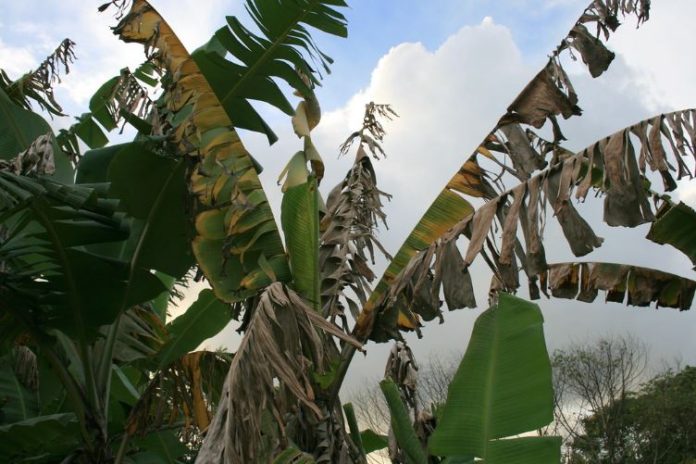Researchers at the International Institute of Tropical Agriculture (IITA) are developing disease-resistant banana varieties to fight Banana Bunchy Top Virus (BBTV), a devastating disease that can wipe out entire banana yields.
The virus, transmitted by banana aphids, has been detected in multiple African countries, including Angola, Benin, Burundi, Cameroon, the Democratic Republic of Congo (DRC), Egypt, Equatorial Guinea, Gabon, Malawi, Nigeria, Rwanda, South Africa, Tanzania, Togo, and Zambia.
According to Tanzanian news outlet The Citizen, IITA scientist Happyness Mpanda confirmed that BBTV-resistant banana seedlings have been sent to Bukavu, DRC, for screening.
Currently, there is no known chemical treatment or cure for BBTV.
The most effective control method remains uprooting and destroying infected plants while ensuring that new seedlings come from certified disease-free sources.
To curb the spread of the virus, the International Institute of Tropical Agriculture (IITA) is screening 72 banana varieties for resistance. Any variety that proves resistant will advance to the banana product development phase, contributing to long-term food security.
In Tanzania, the Tanzania Plant Health and Pesticides Authority (TPHPA) first detected BBTV in Kigoma in 2020, following its spread from Burundi. Since then, the virus has reached seven regions: Dar es Salaam, Coast, Morogoro, Mbeya, Kilimanjaro, Kigoma, and Mwanza.
Experts warn that without strict measures to prevent the movement of infected banana plants across regions, BBTV could spread further, threatening banana production across Africa. Farmers are urged to destroy infected plants immediately and source seedlings only from certified disease-free suppliers.
While the extent of the virus’s spread in Tanzania remains unclear, Kenya could also be at risk. Banana farming is crucial for food security and income generation, particularly in Meru, Kisii, Murang’a, and Nyamira.
Though BBTV has not been widely reported in Kenya, agricultural experts emphasize the need for preventive measures to avoid an outbreak. The Kenya Plant Health Inspectorate Service (KEPHIS) has intensified surveillance to monitor banana seedling movement and ensure farmers have access to disease-free planting materials.
Additionally, the government is collaborating with research institutions to explore resistant banana varieties that could help safeguard Kenya’s banana industry from potential BBTV infections.
Farmers are urged to remain vigilant, report any unusual symptoms in their crops, and implement integrated pest management strategies to control aphids, the primary carriers of BBTV.








